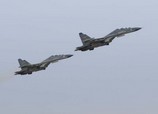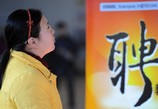
BEIJING - The Chinese media have been outraged by allegations from the United States of Chinese hacker attacks, lambasting the US for its groundless finger-pointing.
The Beijing Daily, a broadsheet newspaper, carried a commentary in its Friday edition which compared the US accusations to a move of hegemony in the virtual community.
The commentary came after US cyber security firm Mandiant on Monday released a report which alleged that a secret Chinese military unit in Shanghai was behind years of cyber attacks against US companies.
The report was followed by a wave of Western media criticism of hacking by China. The Obama Administration was reported to be considering possible fines and trade actions against China.
In response, the Beijing Daily commentary argued that the US has always played the victim card. In fact, the US is the source country of most cyber attacks and the country is responsible for the majority of computer viruses. Using a Chinese idiom, the commentary described the US move as "a thief yelling for help to catch the thief."
The paper further questioned the true purpose hidden behind the US media trumpeting the "Chinese hacking threat." Their reports may allow the US administration greater leeway in carrying out aggressive cyber attacks, and the media fanfare might serve the purpose of wooing parliament's budget approval and public support, read the commentary.
On Thursday, the Hong Kong-based newspaper Wenweipo expressed similar concerns over "Chinese hacking threat" allegations. The paper said it aims at whipping up public support for the US government and the military to wage a cyber war, besides the conventional purpose of containing China as the "China threat" rhetoric does.
Ever since cyberspace became a new battle field, the American military has taken the lead to establish cyber headquarters and recruit numerous hackers to carry out computer virus research and development and build a cyber war arsenal, Wenweipo said.
The American cyber security force is still expanding. The paper cited a report in The Washington Post on January 27, which quoted a US defense department official as saying that the US will increase the size of its cyber security force fivefold over the next several years.
The Global Times, a national tabloid, carried an article on Wednesday calling for China to stand up to the US finger-pointing, saying silence will only invite more accusations.
The tabloid argued that there are too few reports of China being hacked by overseas forces, as many of the cases are held only within government authorities.
Besides, it is always a government spokesperson who does the complaining on behalf of the Chinese side, while it is an individual company or interested parties that tell their stories of being attacked, which makes the US voices heard louder.
The Global Times appealed to relevant technology authorities of China to refute the American accusations through fact finding research. It also encouraged victims of cyber attacks sourced to US IP addresses to tell the world what has happened to them.
Another Global Times commentary said, "We don't believe the Chinese military is completely unprepared in a cyber war, but we are convinced that China will never act on the offensive side."
Foreign Ministry spokesman Hong Lei, at a regular press briefing on Wednesday, said the groundless criticism from the US is "irresponsible and unprofessional, which will not help to solve the problem."
People's Daily, the flagship newspaper of the Communist Party of China, also ran a story Thursday to slam the baseless accusations.
US hacking accusations lack sufficient evidence, Wu Chengrong, a computer scholar with the Shanghai-based Fudan University was quoted as saying by the paper.
A single piece of internal record released by an Internet company is not enough to locate the sources, let alone without any data monitored by telecom sectors, he said.
"To verify accurately the source of hacker attack needs transnational and multi-agency cooperations," Wu said.
Shen Yi, an international relation scholar with the Fudan University, was quoted by the People's Daily as saying that some details of the report released by the Mandiant were unauthentic.
"Repeated accusations of 'Chinese hacker attacks' against the United States reveals the US lack of strategic trust in China and its anxiety over its national security," Shen said.
















 Provocative propaganda on environmental protection leaded by Chen Guangbiao
Provocative propaganda on environmental protection leaded by Chen Guangbiao


![]()
